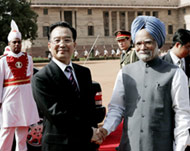India, China sign landmark accord
India and China have signed a historic accord setting out guiding principles to resolve their decades-old border dispute.

The deal is expected to boost economic cooperation and bilateral ties between the two Asian giants.
The border accord, signed in the presence of visiting Chinese Prime Minister Wen Jiabao and his Indian counterpart Manmohan Singh in New Delhi on Monday, sets out a road map to settle the dispute without the use of force.
The two countries have also set themselves a target of increasing bilateral trade to $20 billion by 2008 from $14 billion at present, they said in a joint statement on Monday.
India hailed Wen’s four-day visit, which ends on Tuesday, saying a “strategic partnership for peace and prosperity has been established”.
‘Significant documents’
“It was an extremely successful visit with results that will be far-reaching in character,” Indian Foreign Secretary Shyam Saran said.
The “three-tiered” border deal, described by India‘s National Security Adviser MK Narayanan as “one of the most significant documents” signed by the neighbours, will allow special envoys to negotiate territorial claims as experts delineate the boundary on a map and on the ground.
 |
|
Wen (L) concludes his four-day |
The boundary dispute is the result of a brief but bitter border conflict in 1962 that left ties between the world’s most populous countries in shreds.
India says China is occupying 38,000sq km of Indian territory in Kashmir illegally ceded to it by Pakistan in the 1950s.
Beijing, in turn, claims that the remote 90,000sq km Indian-administered state of Arunachal Pradesh belongs to China.
Largely peaceful
A formal ceasefire line is yet to be established but the unsettled frontier has remained largely peaceful, thanks to agreements signed in 1993 and 1996.
“For the first time we see a commonality on both sides to find a solution,” Narayanan, who worked out the finer points of the pact with Chinese Vice Foreign Minister Dai Bingguo on Sunday, said.
|
“For the first time we see a commonality on both sides to find a solution” MK Narayanan, |
The border agreement commits Beijing and New Delhi to “safeguard due interests of their settled populations in the border areas,” while arriving at a solution.
Another accord, to minimise tensions between the two militaries and increase interaction between them, was also initialled, India‘s Foreign Ministry said.
In addition, other agreements aimed at improving bilateral relations in general – including in trade, civil aviation, water resources management, culture, films, increasing air links and people-to-people contact – were inked.
China also formally buried its decades-old dispute on New Delhi‘s claims over the former British protectorate of Sikkim while India reiterated Beijing‘s sovereign right over Tibet.